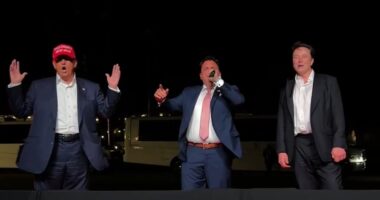Presidential debates changed television. “You want to put a lot of new Supreme Court justices – radical left!” hollered former President Trump at President Biden during the 2020 debate. “Will you shut up man?” implored Mr. Biden. FORMER PRESIDENT TRUMP AND HOUSE SPEAKER MIKE JOHNSON: WHO NEEDS WHO? And television changed politics. “It’s easy to say, ‘Oh, you’ve got to look good on television. Therefore, if you don’t, you’re doomed.’ It’s not quite that easy,” said Walter Podrazik, television curator at the Museum of Broadcast Communications in Chicago. “You have to learn how to speak directly through the medium that most people understand. They know television as well as any politician does because they watch it all the time.” That was the problem facing President Biden in Thursday night’s debate with former President Trump. Mr. Trump fared better because he appeared engaged. Vigorous. President Biden looked pasty and out of it. It doesn’t matter what Mr. Biden represents or what his policies are. When it comes to the debate, you must excel at television. Debates imprinted the importance of live performance onto the debate genre. That mixed reality TV with politics – long before reality TV was a thing. “I am not going to exploit, for political purposes, my opponent’s youth and inexperience,” quipped a 73-year-old President Ronald Reagan during a 1984 debate with former Vice President Walter Mondale, then a youthful 56. “They brought us whole binders full of women,” said 2012 Republican nominee and Sen. Mitt Romney (R-UT) at one of that year’s debates with former President Obama. 2016 Democratic nominee and former Sen. Hillary Clinton, D-N.Y., was in the middle of saying something about the Social Security Trust Fund in a debate with Mr. Trump when he fired off this volley. “Such a nasty woman,” sneered the former President. Debates also amplify on-screen gaffes. “There is no Soviet domination in Eastern Europe,” said President Gerald Ford in a debate with future President Jimmy Carter in 1976. The remark shocked the press corps. And Cold War Eastern Europe. However, debates sometimes deliver unexpected humor. “I’m all ears!” bragged 1992 independent Presidential candidate Ross Perot at a debate with future President Bill Clinton and former President George H.W. Bush. Perot drew attention to his own features – which stuck out like two taxicab doors, attached to a crew cut. UNDER THE DOME AND ON THE DIAMOND Sometimes what’s said isn’t even what most people remember. People easily recall the visual of former President Trump, lurking and then creeping onto the screen behind Hillary Clinton in 2016. Sometimes viewers recall what a candidate does during the debate. Former Vice President and 2000 Democratic Presidential nominee Al Gore is remembered for his theatrical sighs of exasperation at various orations from future President George W. Bush. And then there was Bush 41 in 1992 with Bill Clinton and Perot. All three candidates briefly rested against stools as ABC News Anchor and debate moderator Carole Simpson addressed the audience. The elder Bush slipped a glance at his wristwatch. Viewers interpreted that presidential peek as a subliminal cue that Mr. Bush’s time in office was up after one term. The debate between President Biden and former President Trump marked a sea change in the way American voters experience the forum. Both campaigns worked directly with CNN to develop the debate. It’s the first major alteration to debates since 1988. The campaigns cut the nonpartisan Commission on Presidential Debates (CPD) out of the action this time. Otherwise, each of the 33 Presidential or Vice-Presidential debates since 1988 has been under the aegis of the Commission. The CPD created the town hall format where average citizens could pose questions directly to the candidates. That’s how Illinois power plant worker Ken Bone and his red sweater rose to prominence for a hot second after the 2016 town hall debate. The CPD also hosted the debates at universities. Such was the case with the first debate on September 25, 1988, at Wake Forest University in Winston-Salem, N.C., between then Vice President Bush and then Massachusetts Gov. Michael Dukakis (D). How they conduct the debates is almost as important as the debates themselves. “We want free and fair debates. This commission has shown bias,” argued former Republican National Committee (RNC) Chairwoman Ronna McDaniel on Fox Business in early 2022. The RNC urged GOP Presidential candidates to refuse to participate in any debate not sanctioned by the GOP. But the Biden campaign also rejected the Commission on Presidential Debates. It pushed for a June debate and another one in September. The Biden camp also demanded certain rules – including an option for moderators to mute the microphone of a candidate. In short, both President
Subscribe
Login
0 Comments





